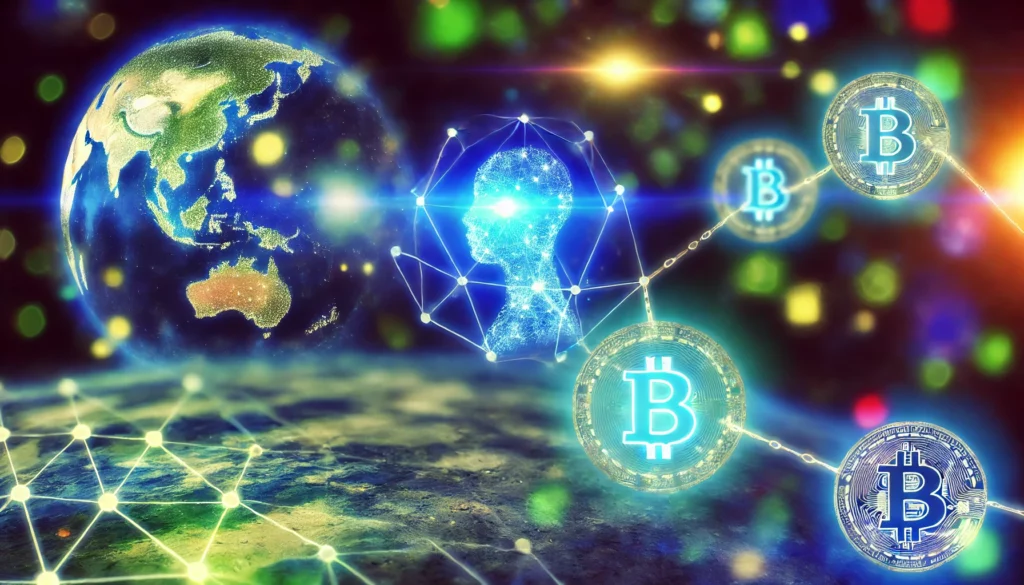The convergence of Artificial Intelligence (AI) and blockchain technology represents a groundbreaking shift in how data is managed, processed, and utilized. Both technologies are transformative in their own right: AI enables machines to learn and make intelligent decisions, while blockchain ensures data integrity, security, and decentralization. Together, they create a synergy that can redefine industries, enhance transparency, and empower decentralized intelligence.
The Core Synergy Between AI and Blockchain
- Transparency and Trust
- Blockchain ensures data immutability and transparency, addressing the “black box” problem in AI by making its decision-making process auditable.
- Data Security and Privacy
- AI requires vast amounts of data, often raising concerns about privacy. Blockchain’s cryptographic features enable secure data sharing and protect user privacy in AI-driven systems.
- Decentralized Intelligence
- Blockchain enables decentralized data marketplaces where AI models can access diverse, unbiased datasets, democratizing AI development and reducing centralization.
- Automation via Smart Contracts
- Blockchain’s smart contracts can automate AI-driven workflows, creating trustless systems for tasks like data processing, payment settlements, and decision-making.
Applications of AI and Blockchain Across Industries
- Healthcare
- Data Sharing: AI-powered systems analyze patient data for diagnostics, while blockchain ensures secure and private sharing of medical records.
- Drug Discovery: Blockchain records research data, enhancing collaboration, while AI accelerates analysis and predictions.
- Finance
- Fraud Detection: AI identifies anomalies in financial transactions, and blockchain ensures transaction history is tamper-proof.
- Automated Trading: AI algorithms make trading decisions, while blockchain enables transparent execution and auditing.
- Supply Chain
- Predictive Analytics: AI optimizes logistics and demand forecasting, while blockchain tracks product provenance for transparency.
- Smart Contracts: AI triggers actions in blockchain-based supply chains, such as releasing payments upon delivery.
- Energy
- Decentralized Grids: AI manages energy distribution efficiently, and blockchain tracks transactions and ensures accountability in energy trading.
- Carbon Credits: Blockchain ensures transparency in carbon credit trading, and AI optimizes carbon footprint assessments.
- Government and Public Services
- Identity Verification: AI enhances biometric systems, while blockchain secures digital identities and prevents tampering.
- Voting Systems: Blockchain ensures transparent voting processes, while AI analyzes electoral data for insights.
- Gaming and Metaverse
- Personalized Experiences: AI tailors gaming experiences, while blockchain enables asset ownership and in-game economies.
- Content Creation: AI generates dynamic content, and blockchain ensures creators are fairly compensated.
Real-World Examples of AI and Blockchain Integration
- SingularityNET
- A decentralized marketplace for AI services, allowing developers to monetize AI models securely using blockchain.
- Ocean Protocol
- A blockchain-based platform enabling secure and privacy-preserving data sharing for AI training, while rewarding data providers.
- Fetch.AI
- A decentralized platform for autonomous AI agents that execute tasks like data processing, supply chain optimization, and smart city management.
- DeepBrain Chain
- A decentralized AI computing network that lowers the cost of training AI models by leveraging blockchain technology.
Key Benefits of AI and Blockchain Integration
- Enhanced Data Quality
- Blockchain ensures the integrity of data fed into AI systems, reducing the risk of biased or inaccurate training datasets.
- Increased Security
- Blockchain protects sensitive AI data through encryption, preventing unauthorized access or tampering.
- Democratization of AI
- Decentralized blockchain networks reduce central control, making AI development and access more inclusive and transparent.
- Improved Accountability
- Blockchain provides a tamper-proof record of AI decisions, fostering trust in automated systems.
Challenges of Combining AI and Blockchain
- Scalability
- Both technologies can be resource-intensive, with blockchain networks often struggling with high transaction loads and AI requiring substantial computational power.
- Integration Complexity
- Combining decentralized blockchain systems with centralized AI models requires technical expertise and robust infrastructure.
- Data Privacy Regulations
- Compliance with regulations like GDPR can complicate blockchain’s immutable nature and AI’s data usage requirements.
- High Costs
- The computational requirements of AI and blockchain can lead to significant operational costs, particularly for small-scale implementations.
Future Trends in AI and Blockchain
- Decentralized AI Models
- Blockchain can host decentralized AI models that are trained collaboratively across global participants, reducing bias and enhancing diversity.
- AI-Powered Smart Contracts
- AI can make smart contracts more dynamic by enabling them to adapt to external conditions or learn from past transactions.
- Tokenized Data Economies
- Blockchain will enable individuals to own and monetize their data, while AI processes it for various applications in a privacy-preserving manner.
- Integration with IoT
- AI and blockchain will jointly manage IoT ecosystems, enabling secure device communication and intelligent automation.
- Quantum-Resistant Systems
- As quantum computing advances, blockchain and AI systems will evolve to incorporate quantum-resistant encryption and algorithms.
Conclusion
The integration of AI and blockchain is set to revolutionize industries by combining intelligence with trust, security, and decentralization. Together, these technologies offer solutions to long-standing challenges, from data privacy to automation and transparency. While challenges like scalability and integration complexity remain, ongoing innovation in decentralized AI marketplaces, secure data sharing, and tokenized ecosystems will continue to push the boundaries of what is possible. As AI and blockchain converge, they are poised to drive the next wave of technological and societal transformation.
